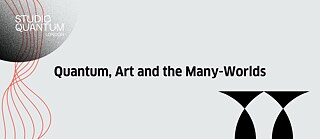|
6:00 PM-9:00 PM
Quantum, Art and the Many-Worlds
A Conversation |Event as part of Studio Quantum residency programme
-
Goethe-Institut London, London
- Language English and British Sign Language (BSL)
- Price Free, but registration is required via Eventbrite

Geopolitical ambitions of power and profit shape the race for quantum technologies, steering industrial and societal applications within a dominant narrative of scientific positivism. Quantum principles are often discussed in relation to computing, highlighting the potential benefits for the medical field, finance, security, and engineering. Meanwhile, quantum’s subversion of Western dualism invites interdisciplinary approaches to co-creation and offers expanded perceptions of the world, the self, and everything in-between. At its core, quantum phenomena, like entanglement, superposition, or decoherence, provide powerful metaphors for a rich dialogue on identities, temporalities, and belonging, challenging linear and binary ways of thinking.
By engaging with quantum imaginaries and cosmology through the interdisciplinary lens of art and performance, this event will explore the undetermined, dynamic, and fragmented nature of human perception while addressing the problematic structures driving technological and scientific development.
This event is curated by researcher and curator Dr. Linda Rocco.
In collaboration with King's College London, Science Gallery London, and the Embassy of the Federal Republic of Germany, London.
Chandrika Narayanan-Mohan is a Dublin-based writer, performer and cultural consultant from India. Chandrika participated in Science Gallery Dublin’s Rapid Residency 2021, and was the Institute of Physics Writer in Residence in 2023. One of her areas area of interest is communicating science through poetry, in particular investigating the intersection of technology, neurodivergence, and migrant identity. For her Studio Quantum residency, Chandrika’s project ‘Code Switching’ explores the quantum nature of migrant identity through poetry. Working with quantum researchers who identify as migrants, Chandrika intends to weave their lived experience and scientific expertise into new work that platforms migrant stories while communicating particle physics to the public.
Eugene Lim is a professor of theoretical physics at King's College London. He is broadly interested in cosmology and theoretical physics, and presently is using high performance computing to test the origins of the Big Bang. He obtained his PhD from the University of Chicago, and has held academic positions at Yale, Columbia and Cambridge universities.
Related links
Location
50 Princes Gate
Exhibition Road
London SW7 2PH
United Kingdom
The lecture will be followed by a reception in the Goethe-Institut Library
Location
50 Princes Gate
Exhibition Road
London SW7 2PH
United Kingdom
The lecture will be followed by a reception in the Goethe-Institut Library